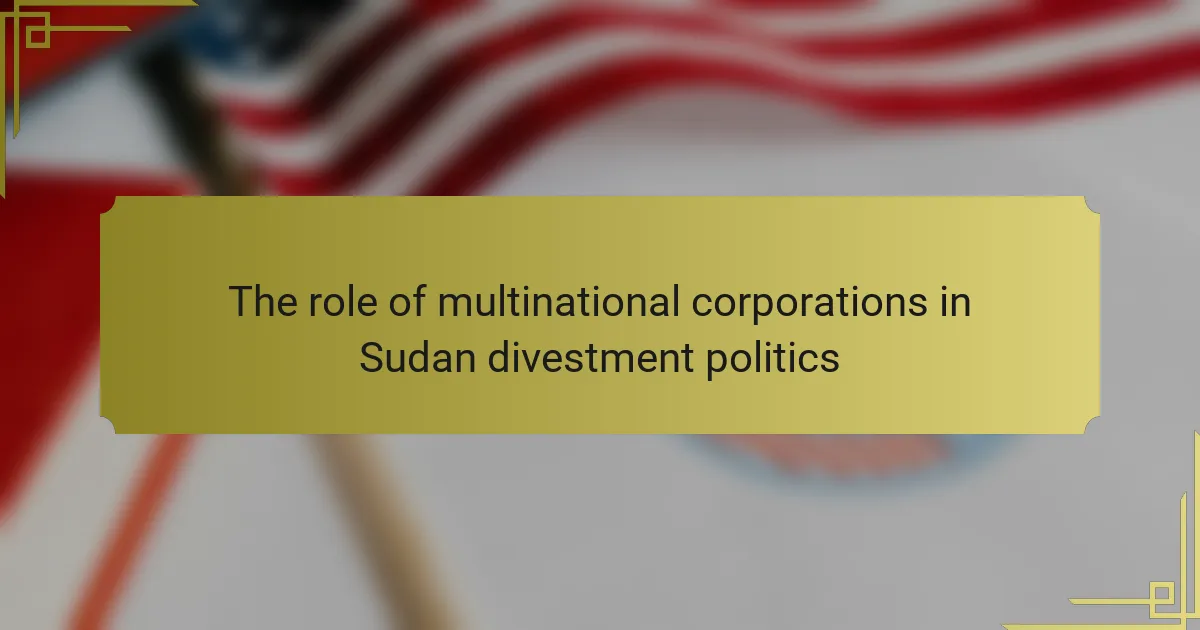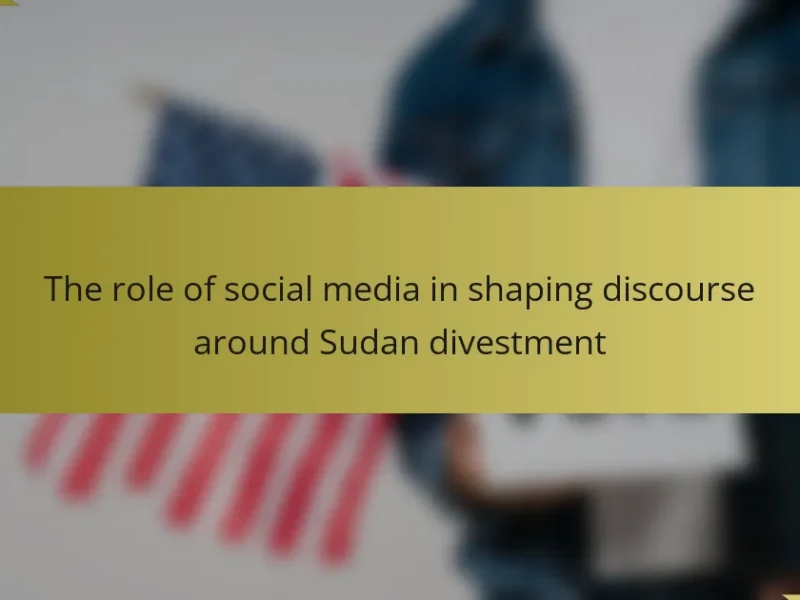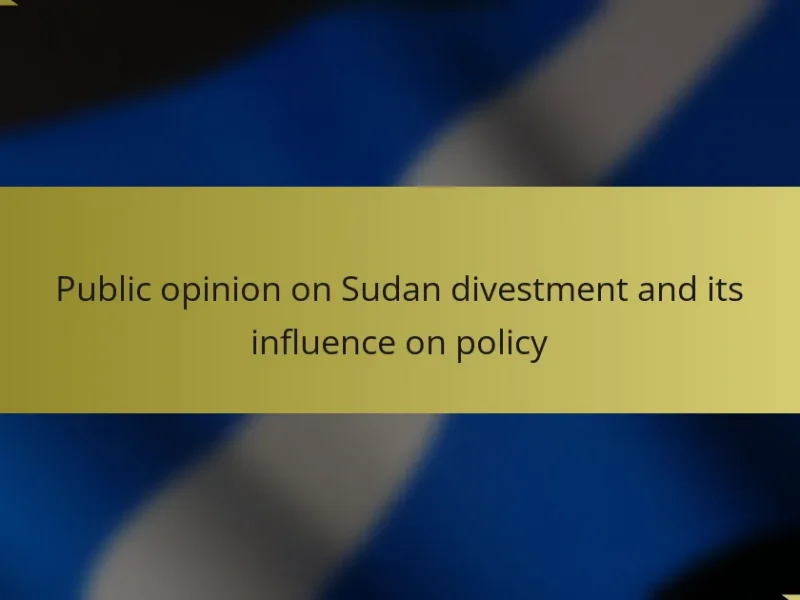Multinational corporations are key players in the divestment politics surrounding Sudan, significantly affecting investment decisions and public perception. Their withdrawal is often driven by ethical concerns over human rights violations and political instability, with companies like Total and Talisman Energy leading the way due to advocacy group pressures. This divestment trend not only reduces foreign investment but also raises global awareness of Sudan’s political issues. Additionally, multinational corporations engage with stakeholders through strategic communication and partnerships, aiming to align their practices with ethical standards and mitigate operational risks. The increasing focus on corporate social responsibility and shareholder activism further underscores the evolving landscape of corporate governance in relation to Sudan.
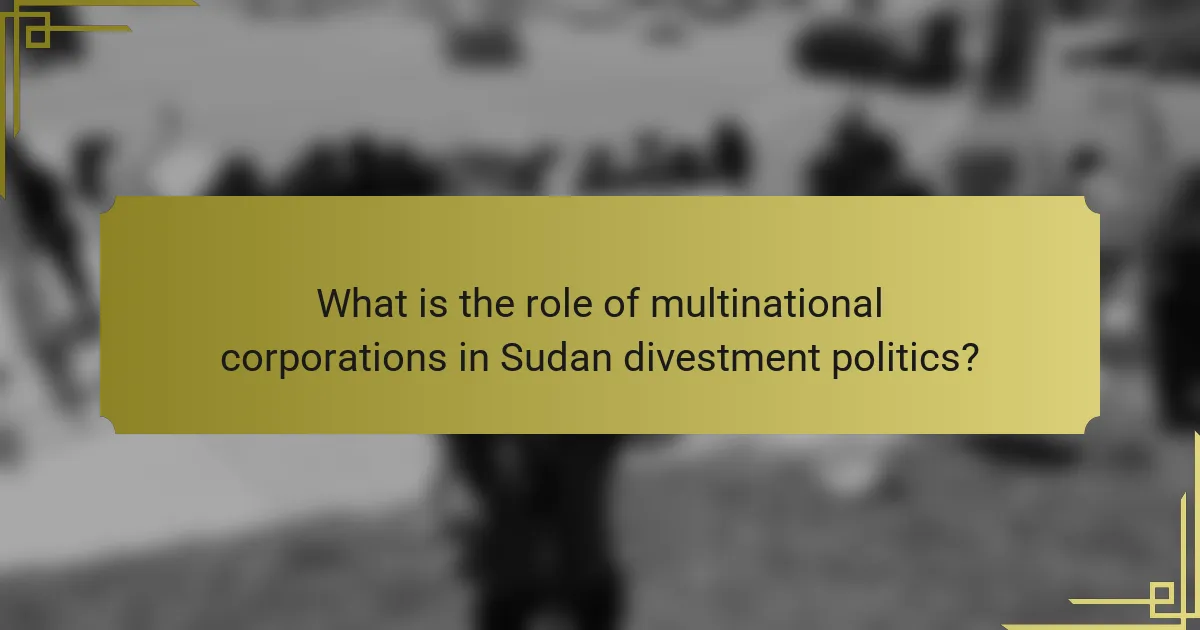
What is the role of multinational corporations in Sudan divestment politics?
Multinational corporations play a significant role in Sudan divestment politics by influencing investment decisions and public sentiment. Their withdrawal from Sudan often stems from ethical concerns related to human rights violations and political instability. For example, major companies like Total and Talisman Energy divested due to pressure from advocacy groups. This divestment can lead to reduced foreign investment in Sudan, impacting the economy. Additionally, it raises awareness about the political situation in Sudan on a global scale. The actions of these corporations can prompt other investors to reconsider their commitments, amplifying the effects of divestment. Thus, multinational corporations serve as both economic actors and ethical influencers in the context of Sudan’s political landscape.
How do multinational corporations influence divestment decisions in Sudan?
Multinational corporations influence divestment decisions in Sudan through economic pressure and public perception. Their investment choices impact local economies significantly. When corporations withdraw, it signals risk to other investors. This can lead to reduced foreign direct investment in Sudan. Additionally, these corporations often respond to activist campaigns. Public backlash against their operations in Sudan can prompt divestment. For instance, companies like Talisman Energy faced pressure to divest due to human rights concerns. This pressure can change corporate policies and lead to broader divestment movements. Overall, their influence shapes the financial landscape of Sudan.
What factors drive multinational corporations to divest from Sudan?
Multinational corporations divest from Sudan due to political instability, human rights violations, and economic sanctions. Political instability creates an unpredictable business environment. Human rights violations, particularly in conflict regions, lead to reputational risks. Economic sanctions from international bodies restrict trade and investment opportunities. The U.S. government imposed sanctions on Sudan in 1997, which were lifted in 2017 but have since influenced corporate decisions. Additionally, consumer pressure for ethical practices affects corporate reputations. These factors collectively drive corporations to withdraw investments from Sudan.
How do political and economic conditions in Sudan affect corporate divestment?
Political and economic conditions in Sudan significantly influence corporate divestment. A volatile political climate leads to uncertainty for multinational corporations. This uncertainty often results in companies withdrawing investments to mitigate risks. Economic instability, characterized by inflation and currency devaluation, further exacerbates this trend. For instance, the Sudanese economy has faced hyperinflation, which diminishes profit margins for businesses. Additionally, international sanctions can restrict trade and investment opportunities, prompting companies to divest. Historical events, such as the civil conflict and government changes, have also triggered mass divestment from the region. Consequently, corporations prioritize stability and predictability, leading to increased divestment in response to adverse conditions.
What are the implications of multinational corporations’ divestment in Sudan?
Multinational corporations’ divestment in Sudan leads to significant economic and social implications. The withdrawal of these corporations reduces foreign investment, which can destabilize the economy. This divestment often results in job losses for local workers, exacerbating unemployment rates. Additionally, essential services and infrastructure may suffer from decreased funding and support. The lack of corporate presence can limit access to technology and expertise. These changes can lead to increased poverty and social unrest within the population. Furthermore, divestment can impact Sudan’s international relations, as it may signal global disapproval of the country’s policies. Overall, the implications of divestment are profound, influencing both the economy and societal stability in Sudan.
How does divestment impact the Sudanese economy?
Divestment negatively impacts the Sudanese economy by reducing foreign investment and access to capital. When multinational corporations withdraw, it leads to decreased job opportunities. This withdrawal often results in lower tax revenues for the government. Consequently, public services and infrastructure development suffer. For example, in 2011, divestment from the oil sector led to a significant drop in revenue. The Sudanese economy became more vulnerable to external shocks due to reduced diversification. Additionally, divestment can lead to increased inflation and currency devaluation. Overall, the economic stability of Sudan is compromised by divestment actions.
What social consequences arise from multinational corporations withdrawing from Sudan?
The withdrawal of multinational corporations from Sudan leads to significant social consequences. These corporations often provide essential services and employment opportunities. Their exit can result in increased unemployment rates, leading to economic instability. Communities that relied on these companies for infrastructure development may face deteriorating conditions. Access to basic services like healthcare and education can diminish as funding decreases. Social unrest may arise due to rising poverty and dissatisfaction with the government. Additionally, the lack of foreign investment can hinder long-term development efforts. Historical context shows that previous withdrawals have led to similar adverse effects on local populations.
What strategies do multinational corporations use in Sudan divestment politics?
Multinational corporations employ various strategies in Sudan divestment politics. These strategies include public relations campaigns to improve their image. They also engage in lobbying efforts to influence policy decisions. Many corporations focus on ethical investment criteria to guide their operations. Some choose to withdraw investments to align with international sanctions. Others may divest selectively, retaining interests in less controversial sectors. Additionally, corporations often collaborate with NGOs to advocate for human rights. These actions are aimed at mitigating reputational risks associated with Sudan’s political climate.
How do corporations assess risks before divesting from Sudan?
Corporations assess risks before divesting from Sudan by evaluating political, economic, and social factors. They analyze the stability of the Sudanese government and potential regulatory changes. Companies also consider the impact of divestment on their reputation and stakeholder relationships. Financial risks, such as currency fluctuations and market volatility, are assessed. Additionally, corporations review human rights conditions and ethical implications of their operations. They often consult risk assessment frameworks and external reports for comprehensive insights. This multi-faceted approach helps corporations make informed decisions regarding their presence in Sudan.
What role do public relations play in corporate divestment strategies?
Public relations play a crucial role in corporate divestment strategies. They help manage the communication surrounding the decision to divest. Effective public relations can mitigate negative perceptions and maintain stakeholder trust. This is particularly important in sensitive contexts, such as divestment from Sudan due to ethical concerns. Companies often use public relations to articulate their reasons for divestment clearly. They aim to highlight their commitment to social responsibility and ethical practices. Research indicates that transparent communication can enhance corporate reputation during divestment. For example, companies that proactively engage with media and stakeholders tend to experience less backlash.
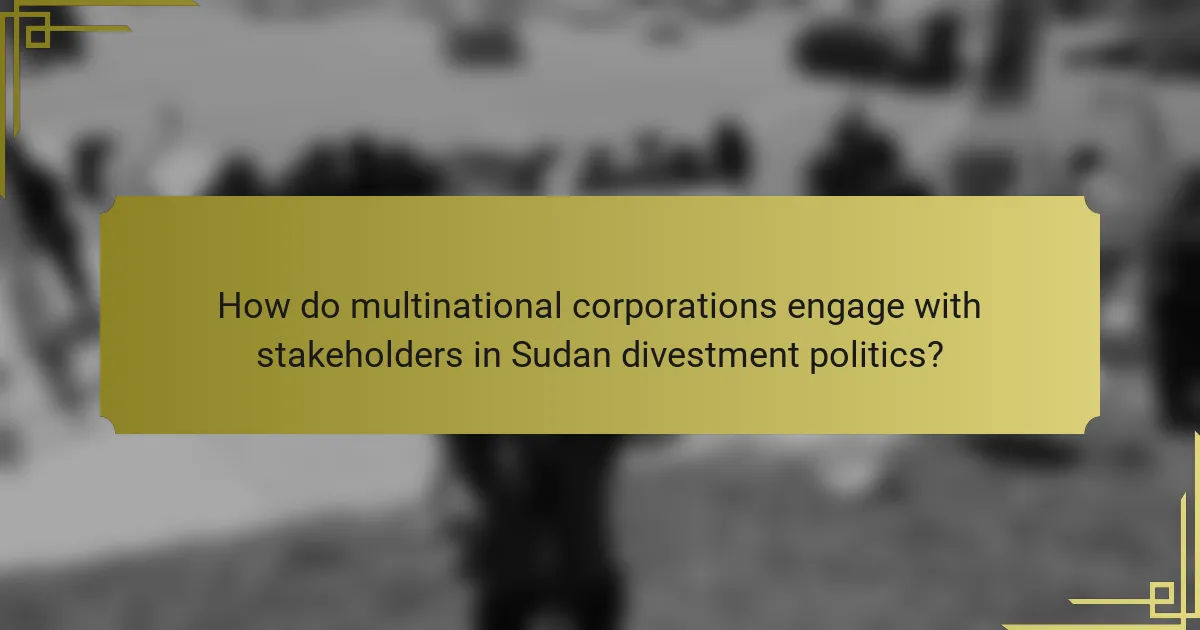
How do multinational corporations engage with stakeholders in Sudan divestment politics?
Multinational corporations engage with stakeholders in Sudan divestment politics through strategic communication and partnerships. They often collaborate with non-governmental organizations to align their practices with ethical standards. These corporations also participate in dialogues with local communities to understand their concerns. By doing so, they aim to mitigate risks associated with operating in Sudan. Additionally, they may issue public statements to clarify their positions on divestment. This engagement helps to build trust among stakeholders. Research indicates that effective stakeholder engagement can influence corporate reputation positively. Thus, multinational corporations utilize these strategies to navigate the complexities of divestment politics in Sudan.
Who are the key stakeholders involved in the divestment process?
Key stakeholders involved in the divestment process include multinational corporations, governmental bodies, and non-governmental organizations (NGOs). Multinational corporations often initiate or respond to divestment campaigns due to public pressure or ethical considerations. Governmental bodies may impose sanctions or provide guidelines influencing divestment decisions. NGOs play a crucial role in raising awareness and advocating for divestment through campaigns and research. Additionally, investors and shareholders are stakeholders as they may influence corporate policies regarding divestment. Academic institutions and think tanks also contribute by conducting research on the impacts of divestment. These stakeholders collectively shape the divestment landscape and influence corporate actions in Sudan.
What roles do local communities play in influencing corporate decisions?
Local communities play a significant role in influencing corporate decisions. Their feedback can shape corporate policies and practices. Companies often seek to maintain a positive public image. Community opinions can affect brand reputation and customer loyalty. Local protests or support can lead to changes in corporate strategies. For instance, companies may divest from regions facing community opposition. Research indicates that community engagement can lead to more sustainable business practices. This dynamic underscores the importance of corporate social responsibility in decision-making.
How do international organizations affect multinational corporations’ actions in Sudan?
International organizations influence multinational corporations’ actions in Sudan primarily through regulatory frameworks and advocacy. These organizations, such as the United Nations and the African Union, set guidelines that promote ethical business practices. They often impose sanctions or restrictions that compel corporations to reconsider their investments in Sudan. For example, the UN Security Council has enacted sanctions targeting specific sectors, affecting multinational operations. Additionally, international organizations advocate for human rights and environmental standards, pressuring corporations to align with these principles. This advocacy can lead to reputational risks for companies that ignore these standards. Reports from organizations like Human Rights Watch detail corporate compliance with these pressures, demonstrating their significant impact.
What are the challenges faced by multinational corporations in Sudan divestment politics?
Multinational corporations face significant challenges in Sudan divestment politics. Political instability in Sudan complicates corporate decision-making. Frequent changes in government and policy create an unpredictable business environment. Additionally, multinational corporations encounter pressure from activists advocating for human rights and ethical investment. This pressure can lead to reputational risks and affect shareholder value. Economic sanctions imposed by foreign governments further complicate operations. These sanctions may restrict access to financial markets and resources. Furthermore, navigating local regulations can be challenging due to corruption and bureaucratic hurdles. These factors collectively hinder effective divestment strategies for multinational corporations in Sudan.
How do regulatory frameworks impact corporate divestment?
Regulatory frameworks significantly influence corporate divestment decisions. These frameworks establish the legal and operational environment for businesses. Regulations can either encourage or discourage companies from divesting their interests in certain markets. For instance, stringent sanctions can compel firms to exit specific regions, such as Sudan, to comply with international laws. Conversely, supportive policies may facilitate smoother divestment processes. Research shows that companies often assess regulatory risks when contemplating divestment. A study by the United Nations indicated that regulatory pressures play a critical role in shaping corporate behavior in conflict zones. This demonstrates the direct link between regulatory frameworks and corporate divestment strategies.
What ethical dilemmas do corporations encounter when deciding to divest?
Corporations encounter several ethical dilemmas when deciding to divest. One major dilemma involves balancing profit motives with social responsibility. Divesting from regions with human rights violations may impact financial performance. Additionally, corporations face public scrutiny regarding their motives for divestment. Stakeholders may question whether divestment is a genuine ethical stance or a strategic business decision.
Another dilemma arises from the potential negative impact on local economies. Divesting could lead to job losses and economic instability in affected regions. Corporations must consider the broader consequences of their actions on communities. Furthermore, there are concerns about the effectiveness of divestment as a tool for promoting change. Critics argue that divestment may not significantly influence the behavior of oppressive regimes.
These dilemmas are particularly pronounced in the context of Sudan, where multinational corporations must navigate complex political and ethical landscapes.
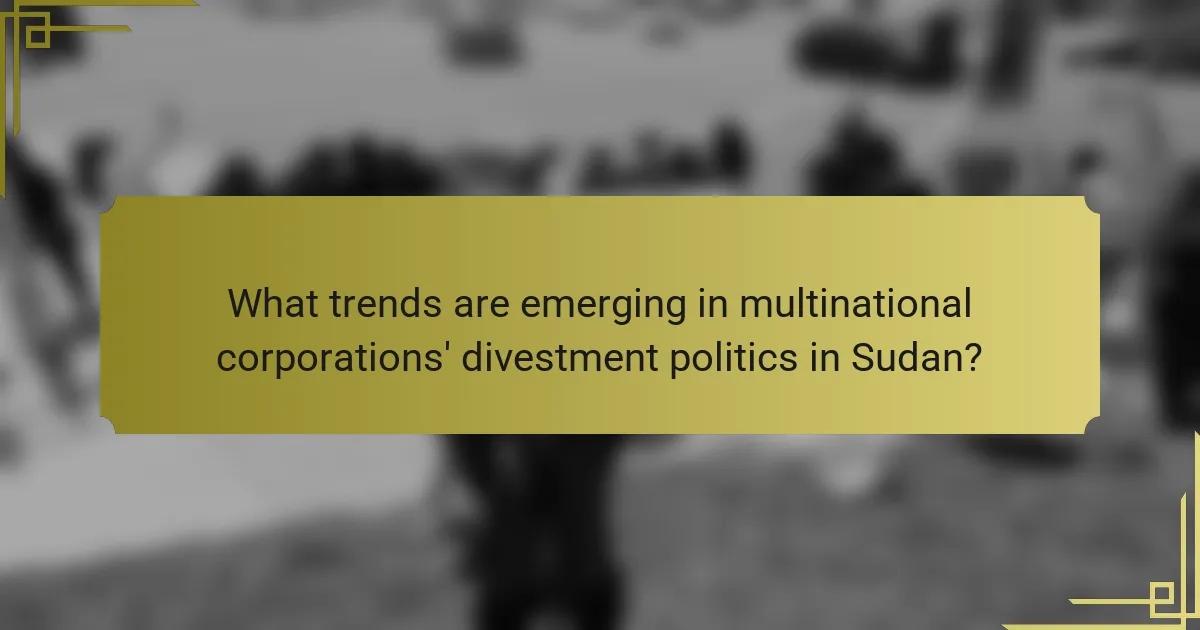
What trends are emerging in multinational corporations’ divestment politics in Sudan?
Multinational corporations are increasingly divesting from Sudan due to political instability and human rights concerns. This trend reflects a growing awareness of corporate social responsibility. Companies are reassessing their investments in light of international sanctions and ethical considerations. Many firms are prioritizing transparency and sustainability in their operations. Reports indicate a shift towards divesting from industries linked to conflict and oppression. Additionally, there is a rise in shareholder activism demanding ethical practices. These trends highlight the evolving landscape of corporate governance in relation to Sudan.
How is the global political landscape affecting corporate divestment in Sudan?
The global political landscape significantly influences corporate divestment in Sudan. International sanctions and diplomatic pressures drive multinational companies to withdraw investments. For instance, the U.S. government has imposed sanctions on Sudan due to human rights violations. These sanctions create legal and reputational risks for corporations operating in the country. Additionally, global advocacy groups have increased scrutiny on businesses linked to Sudan. This pressure leads companies to divest to maintain their ethical standards and public image. As a result, many corporations are re-evaluating their presence in Sudan in light of these global political dynamics.
What shifts are occurring in public perception regarding multinational corporations in Sudan?
Public perception regarding multinational corporations in Sudan is shifting towards skepticism and criticism. Increased awareness of corporate involvement in local conflicts has led to this change. Many Sudanese citizens now view these corporations as exploitative rather than beneficial. Reports of human rights abuses linked to corporate activities have fueled public distrust. Social media has played a pivotal role in amplifying these concerns. Campaigns advocating for divestment from companies perceived as harmful have gained traction. This shift reflects a broader demand for corporate accountability and ethical practices in Sudan. Recent surveys indicate a growing call for transparency from these entities.
How are technological advancements influencing divestment strategies?
Technological advancements are reshaping divestment strategies by enhancing data analysis and transparency. Improved analytics tools allow investors to assess risks associated with companies more accurately. Technologies like blockchain provide a transparent record of transactions, fostering trust in divestment processes. Additionally, digital platforms facilitate communication and coordination among stakeholders. These advancements enable rapid dissemination of information regarding ethical concerns. For instance, real-time data on corporate actions can prompt quicker divestment decisions. Overall, technology empowers investors to align their portfolios with ethical standards more effectively.
What best practices can multinational corporations adopt in divestment politics?
Multinational corporations can adopt several best practices in divestment politics. First, they should conduct thorough impact assessments before divesting. This ensures they understand the socio-economic implications of their actions. Second, engaging stakeholders is crucial. Corporations must communicate with local communities and governments to gauge their concerns and expectations. Third, establishing clear divestment criteria can guide decision-making. These criteria should align with corporate values and ethical standards. Fourth, transparency in the divestment process builds trust. Corporations should publicly disclose their reasons and methods for divestment. Fifth, companies can collaborate with NGOs and advocacy groups. This partnership can enhance their understanding of the political landscape. Lastly, monitoring and evaluating the outcomes of divestment decisions is essential. This allows corporations to learn and adapt their strategies in future engagements. These practices help multinational corporations navigate divestment politics effectively while maintaining their corporate responsibility.
How can corporations ensure responsible divestment processes?
Corporations can ensure responsible divestment processes by implementing transparent criteria for divestment decisions. This involves assessing the social and environmental impact of their investments. They should engage with stakeholders, including local communities, to understand the implications of divestment. Additionally, corporations must establish clear timelines for divestment to avoid abrupt withdrawals that could destabilize local economies. Regular reporting on divestment strategies enhances accountability. According to a report by the United Nations, responsible divestment can mitigate negative consequences for affected regions. By following these practices, corporations can contribute positively to the communities impacted by their divestment.
What lessons can be learned from previous divestment cases in Sudan?
Previous divestment cases in Sudan highlight the importance of corporate social responsibility. Companies that divested often faced reputational risks associated with human rights violations. For example, the divestment by Talisman Energy in 2002 was influenced by international pressure regarding Sudan’s civil conflict. This case demonstrated that stakeholder activism can significantly impact corporate decisions. Additionally, divestment can lead to financial repercussions for regimes involved in unethical practices. The withdrawal of foreign investments often weakens the economic power of oppressive governments. Furthermore, successful divestment campaigns require coordinated efforts among NGOs, investors, and governments. Overall, these cases emphasize the effectiveness of collective action in promoting ethical corporate behavior.
The primary entity of this article is multinational corporations and their influence on divestment politics in Sudan. The article examines how these corporations impact investment decisions and public sentiment through their withdrawal due to ethical concerns, human rights violations, and political instability. It outlines the factors driving divestment, including economic sanctions and local community feedback, and discusses the implications for the Sudanese economy and society. Additionally, it highlights the challenges faced by corporations in navigating divestment politics, the role of stakeholders, and emerging trends in corporate behavior regarding ethical practices and transparency.
